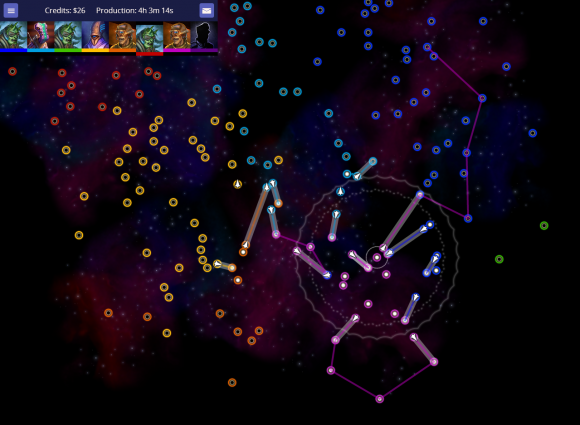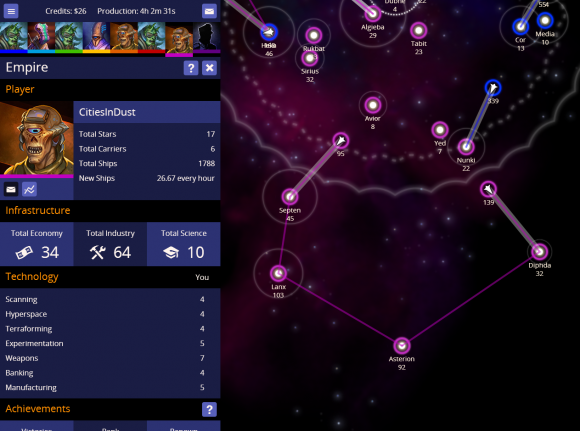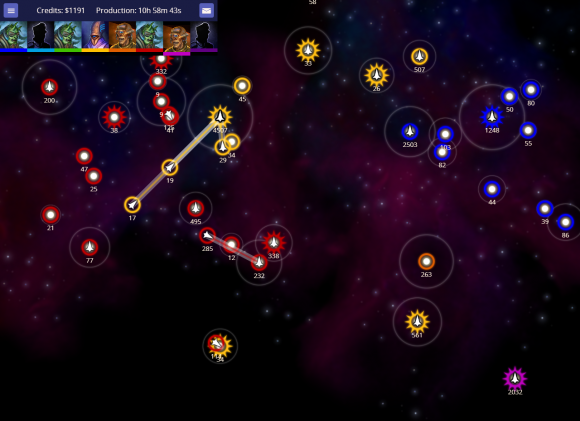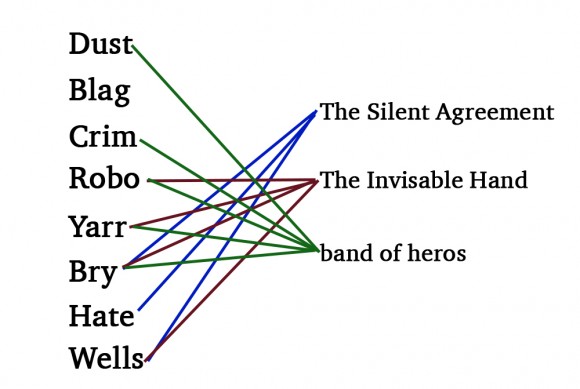Remember back in early 2012 when I wrote a series about a game of Neptune’s Pride in which I and eight other players bent the rules so far the space-time continuum nearly inverted?
If you’ve come to Arcadian Rhythms since then I recommend having a look back at that series if you like Neptune’s Pride, are a fan of Iron Helmet’s games in general, enjoy reading about players subverting game systems, or simply like the idea of players cooperating in a highly competitive and subversive environment.
A few months ago I and eight other players – some from that same game, others who I’d not played alongside before – took on Neptune’s Pride II: Triton.
Although still in beta the game is fully functional and playable. There are many obvious similarities with its predecessor; key differences are that fleet speed can no longer be improved through research, meaning that the game’s pace is consistent throughout, a heavily improved interface that streamlines messaging and planet upgrading, a superior waypoint system for fleet movement, a bevy of new technology options, and warpgates that allow faster movement between owned planets.
In all other respects its the same game. Players compete to capture planets, upgrading their economies (for income), industry (for ship production) and technology (for research). It’s important to compete with your opponents in every field, although an initial push in one area – to the detriment of others – can be an effective if risky strategy. It doesn’t take long for borders to rub up against one another, and war is an inevitability.
Well, an inevitability for players other than heroes of that famous past campaign, anyway.
Now, this isn’t going to be a detailed diary. That last experience of playing Neptune’s Pride was exhausting, as was writing about such an extended experience in anything approaching brevity. But I will give you a potted summary of how things panned out, because those who play games are often interested in reading about games being played. It’s just one of those things.
When the game opened up I had a few items to consider. Firstly, I was using the same name as before: CitiesInDust (it’s an old Siouxsie & the Banshees song). This meant that anyone who had previous played with me would be expecting a certain playstyle and diplomatic approach from me. That could be played to my advantage, but it also meant I was more of a known quantity, which is a disadvantage. Hmm.
Secondly, did I really want to throw myself into this game as I had in the first? In truth, I didn’t. I wanted to play the game both to try out the sequel and have some fun alongside players I was fond of. I didn’t, however, want to mess about with waking up early or going to bed late to set up X or Y move. (At this point I didn’t realise that Triton is a bit easier to manage in terms of fleet waypoints and arrival times.) I simply wasn’t that invested. Of course this was a fact I had to conceal, because a player who isn’t monitoring the game closely is a juicy and non-reactive target for a more focused opponent.
Thirdly, how did I want to play the game? My previous diplomatic and conciliatory approach involved alliances with most other players, involvement in only a few minor skirmishes, and good relations with everyone except a neighbour who – after an early accidental incident – entirely distrusted me for the entire game. (This culminated, hilariously, in his surrender involving gifts to every empire. Someone got his technology, another his money, another was invited to take his planets, and I received his ships. Every single fleet he had was launched into my empire. It was one of the most spectacular fuck-yous I have ever experienced in a game.)
Lightning does strike twice but exceedingly improbable game experiences tend not to. I resolved to play the game as one should play Neptune’s Pride: pick an opponent, make some friends, and be ready to pursue opportunistic gains. Publicly, however, I’d be diplomatic and friendly. That might fool a few people into thinking I was role-playing the same bunch of reserved space turtles as in my first game.
This initially went well: I befriended my orange neighbour, Crimer, and attacked my light green neighbour, Blarg the Space Bastard, who had had the temerity to invite friendly relations with me. Between my inroads and those of the dark blue player to the north (RoboCaptain, from the original game), Blarg didn’t last long, though we left him a few planets. We’re nice space warlords. Our genocides are sometimes not total.
Crimer had been trying to set up an alliance of five players, which he’d called the Band of Heroes or some such. I was happy to be a part of the largest alliance in the game and, as it turned out, Crimer was a pretty good ally. My initial resolve to be opportunistic about the concept of betrayal never really panned out. I don’t think I have it in me.
I spent a while trying to get into the action towards the centre of the map, where Crimer was struggling against Captain Wells (the winner of the first game). Wells was slowly winning, but unfortunately I was struggling to find a beachhead. I also felt a bit bad at fighting Wells as he and I had gotten on in the first game, but so be it.
I also had a problem in that another player, Brycycle, had nabbed a few planets I had my eye on before betraying the Band of Heroes and revealing himself as Wells’ ally. He was launching ships into my territory and doing well enough that a planet very near my capital was changing hands every other day. At the same time RoboCaptain, ostensibly another part of the Band of Heroes, wasn’t fighting Brycycle and was massing ships near my border. In fairness, so was I. It pays to be cautious in Neptune’s Pride.
All this meant that I wasn’t able to help Crimer, and the tide continued to turn against him as no one challenged Wells. Eventually Crimer saw the writing on the wall and offered to let me take some of his better planets so that I could fight on. Unfortunately while I was preparing to take advantage of this, and at the same time driving Brycycle out of my empire, RoboCaptain decided the time was right to strike. Under his onslaught my fleets crumbled quickly. Brycycle took advantage of this to redouble his assault, and I crumbled less than a day after Crimer.
I’d been role-playing in messages throughout the game, just as I had in the first game, because it helped me feel more invested and engaged and it was fun to pretend to be a weird alien emperor. I notified Crimer of my inevitable defeat and informed RoboCaptain that he had won and that I was evacuating to my southernmost planet. Our relations were okay despite the fact that he’d wiped the floor with me, and after getting a half-promise from me that the 1,500+ ships at my refuge weren’t going to do anything cheeky he moved the main bulk of his fleets away to other fronts.
I was effectively out of the game at this point, as was Crimer, who also had just one or two stars left. I still checked in every so often, though. I wanted to know how everything panned out. And so it was that I laughed mightily when Brycycle – the thorn in my side who stalled all my plans – was wiped off the map by the huge empires on either side of him. Under their combined pressure he lasted even less time than I did. Wells, too, went down hard; though he fought on for a long time RoboCaptain and a player I’d barely spoken to – SGT Hatred, the red player and another alumnus of the previous game – defeated him. At this point the fight was between these two giants and, eventually, after a long struggle, SGT Hatred emerged victorious.
Here are a few screenshots of the game. I didn’t take many, so these are all from towards the end. Click to open larger versions.



One thing I didn’t mention above in great detail were the multiple allegiances. Captain Wells made this handy infographic which charts this:

If any other players want to describe their own experiences, please do! And if you’ve any screengrabs from the game you’d like me to host, email them over to me and I’ll add them to this page.
You can play Neptune’s Pride 2: Triton here.
Comments
6 responses to “Neptune’s Pride II: across a sea of scheming”
I just recently played the Game of Thrones board game and it is like a more condensed version of Neptune's Pride.
A game lasts about 5 hours but the wheeling and dealing that goes on in that game is pretty interesting, a lot of power playing and combat is only the second most important thing behind diplomacy.
I've heard good things about that boardgame – more positive than what I've heard about its videogame adaptations!
At 5 hours it is definitely a more condensed experienced. :D
I'll bring it down at some point and we should play it. Claire's table is big enough to house the humongous board.
Excellent. Claire likes board games and I think I'm likely to get drawn in!
Nice. How does it really compare to the life-sucking vampiric nature of the original game? Is it easier to disengage?
I think that will depend primarily on how you choose to engage with the game. From the post-game email thread I get the impression that everyone was into it, but no one was obsessively so.
I don't think I mentioned this in the write-up above but I actually missed a couple of weekends entirely (I am very forgetful). I suspect that eventually this was noticed and that was factored into the decisions by Brycycle and RoboCaptain to go for me. :)
From a mechanical standpoint the locking of fleet speeds is a big plus; you don't end up with fleets hurtling between stars in a couple of hours. I think that's a tweak for the better when considering player sanity.
This does mean that the inevitable endgame is a bit more drawn out – but by that point whichever heavy hitters are still in play have so many fleets it doesn't matter that much anyway. It comes down to who has which numbers, where they come from and how/where they are directed, just as in the original game.